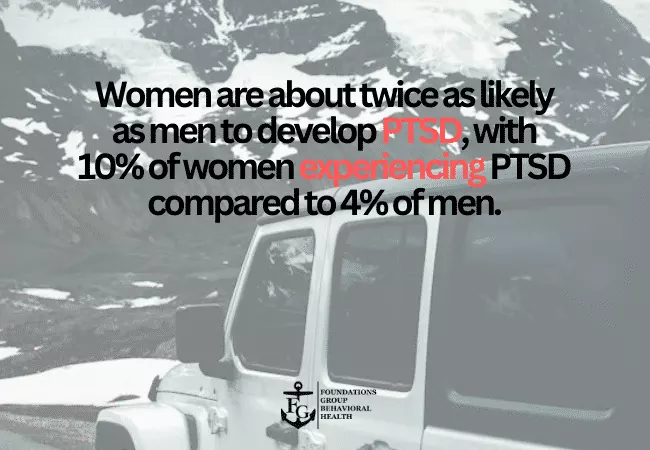Trauma and Post-Traumatic Stress Disorder (PTSD) are often discussed interchangeably, but they represent different experiences and conditions. Trauma refers to the emotional response to distressing events, while PTSD is a mental health disorder that may develop as a result of trauma. Understanding these distinctions is crucial for seeking the appropriate treatment and support.
At Foundations Group Behavioral Health, we are committed to helping individuals overcome the effects of trauma and PTSD. Through our specialized programs, including Post-Traumatic Stress Disorder Treatment, Trauma Disorder Treatment Program, and Co-Occurring Disorder Treatment Program, we provide comprehensive care tailored to individual needs. Our services, such as Psychiatric Day Treatment, Half Day Treatment Program, and Outpatient Mental Health Program, are designed to support healing and recovery.
What is Trauma?
Trauma is the emotional and psychological response to an event or series of events perceived as threatening, overwhelming, or harmful. While everyone experiences trauma differently, it often leaves a lasting impact on emotional well-being and physical health.
Types of Trauma:
- Acute Trauma: Results from a single event, such as a car accident, assault, or natural disaster.
- Chronic Trauma: Arises from prolonged or repeated exposure to distressing events, such as domestic violence, bullying, or workplace harassment.
- Complex Trauma: Involves exposure to multiple traumatic events, often in interpersonal relationships, such as ongoing abuse or neglect during childhood.
Common Symptoms of Trauma:
- Emotional numbness or detachment
- Heightened startle response
- Difficulty concentrating
- Nightmares or disturbed sleep patterns
- Intense emotional reactions to reminders of the event
Trauma responses often resolve over time, but in some cases, they persist or worsen, leading to conditions like PTSD.
What is PTSD?
Post-Traumatic Stress Disorder (PTSD) is a psychiatric disorder that develops after experiencing or witnessing a traumatic event. Unlike trauma, which is a natural reaction, PTSD involves a prolonged and disabling response that significantly impacts daily functioning.
Symptoms of PTSD (DSM-5 Criteria):
- Intrusive Memories: Flashbacks, nightmares, or intrusive thoughts about the traumatic event.
- Avoidance: Efforts to avoid reminders of the trauma, such as people, places, or activities.
- Negative Changes in Thinking and Mood: Feelings of detachment, guilt, or shame, and difficulty experiencing positive emotions.
- Arousal and Reactivity Symptoms: Hypervigilance, irritability, trouble sleeping, or being easily startled.
Key Differences Between Trauma and PTSD
While trauma is a universal experience, not everyone exposed to trauma develops PTSD. Here’s a closer look at the distinctions:
1. Onset and Duration
- Trauma: Emotional responses typically occur immediately after an event and may diminish over weeks or months.
- PTSD: Symptoms may appear weeks, months, or even years after the trauma and persist without treatment.
2. Severity and Impact
- Trauma: Symptoms may cause temporary distress but often allow individuals to maintain normal functioning with time or support.
- PTSD: Significantly disrupts daily life, affecting work, relationships, and overall quality of life.
3. Diagnosis and Treatment Needs
- Trauma: May be addressed through short-term therapy, self-care, or support groups.
- PTSD: Requires specialized treatment, such as trauma-focused therapy, medication, and structured programs.
The Effects of Untreated Trauma and PTSD
Both trauma and PTSD, if left untreated, can lead to severe long-term consequences, including:
- Mental Health Disorders: Anxiety, depression, substance use disorders, or suicidal ideation.
- Physical Health Issues: Chronic pain, heart disease, or autoimmune disorders, often linked to prolonged stress responses.
- Impaired Relationships: Difficulty maintaining trust or emotional intimacy in personal and professional relationships.
- Workplace Challenges: Reduced productivity, absenteeism, or difficulty maintaining employment.
Early intervention is critical to prevent these complications and support recovery.
How Trauma Impacts the Brain
Trauma has a profound impact on the brain, altering its structure and functioning in ways that can cause lasting emotional and physical symptoms. Understanding these changes helps us appreciate why trauma can be so debilitating and how targeted treatments can support recovery.
1. Hyperactivation of the Amygdala
The amygdala, often referred to as the brain’s “fear center,” becomes hyperactive in response to trauma. This part of the brain is responsible for detecting threats and triggering the “fight, flight, or freeze” response. After trauma, the amygdala remains overactive, causing:
- Hypervigilance: Constantly scanning for danger, even in safe situations.
- Exaggerated Startle Response: Reacting strongly to minor stimuli, like loud noises or sudden movements.
2. Impairment of the Hippocampus
The hippocampus, the brain’s memory processor, plays a crucial role in distinguishing between past and present events. Trauma can shrink the hippocampus, leading to:
- Flashbacks: Reliving traumatic events as though they are happening in the present.
- Memory Fragmentation: Difficulty recalling the event clearly or experiencing disjointed memories.
3. Dysregulation of the Prefrontal Cortex
The prefrontal cortex, which helps regulate emotions, make decisions, and assess risks, becomes less active in individuals who experience trauma. This can result in:
- Emotional Dysregulation: Difficulty managing strong emotions or calming down after being upset.
- Impulsive Behaviors: Acting without thinking in response to emotional triggers.
4. Chronic Stress Response
Trauma keeps the body in a heightened state of stress, causing the brain to release excessive cortisol (the stress hormone). Over time, this chronic activation of the stress response can lead to:
- Physical Symptoms: Fatigue, headaches, digestive issues, and chronic pain.
- Weakened Immune System: Increased susceptibility to illnesses.
Treatment Options for Trauma and PTSD at Foundations Group Behavioral Health
At Foundations Group Behavioral Health, we provide a range of evidence-based treatments to help individuals process trauma, manage PTSD symptoms, and rebuild their lives.
1. Post-Traumatic Stress Disorder Treatment
Our specialized PTSD treatment focuses on reducing distress and fostering resilience. Techniques include:
- Trauma-Focused Cognitive Behavioral Therapy (TF-CBT): Helps individuals reframe negative thoughts and develop coping skills.
- Eye Movement Desensitization and Reprocessing (EMDR): Assists in processing traumatic memories and reducing emotional intensity.
- Prolonged Exposure Therapy: Gradually desensitizes individuals to trauma-related triggers.
2. Trauma Disorder Treatment Program
This program addresses the emotional and psychological effects of trauma, helping individuals rebuild a sense of safety and control. Therapy sessions focus on processing traumatic events and developing healthy coping mechanisms.
3. Psychiatric Day Treatment
Our intensive Psychiatric Day Treatment program provides structured therapy during the day, allowing individuals to return home in the evening. This program is ideal for those requiring focused care without full hospitalization.
4. Half Day Treatment Program
A flexible option for individuals balancing treatment with other commitments, the Half Day Treatment Program focuses on therapeutic interventions tailored to each person’s needs.
5. Outpatient Mental Health Program
For individuals transitioning from more intensive care or managing long-term symptoms, our Outpatient Mental Health Program offers ongoing support and therapy.
6. Co-Occurring Disorder Treatment Program
Trauma and PTSD often coexist with other mental health conditions, such as anxiety, depression, or substance use. Our integrated Co-Occurring Disorder Treatment Program ensures all aspects of mental health are addressed.

How Treatment Helps Rewire the Brain
The brain’s ability to adapt and heal, known as neuroplasticity, offers hope for recovery after trauma. With effective treatments, individuals can reduce the neurological impact of trauma and regain control over their emotions and behaviors.
1. Calming the Amygdala
Trauma-focused therapies, such as Eye Movement Desensitization and Reprocessing (EMDR) and Trauma-Focused Cognitive Behavioral Therapy (TF-CBT), help regulate the overactive amygdala. These treatments teach the brain to respond more calmly to triggers, reducing symptoms like hypervigilance and anxiety.
2. Strengthening the Hippocampus
Therapies aimed at processing traumatic memories help the hippocampus function more effectively. Techniques like Exposure Therapy or Narrative Therapy help individuals:
- Recognize that the trauma is in the past.
- Organize fragmented memories into a coherent narrative.
3. Reactivating the Prefrontal Cortex
Mindfulness-based therapies, such as Dialectical Behavior Therapy (DBT), help re-engage the prefrontal cortex. These treatments teach skills like emotional regulation, impulse control, and decision-making, allowing individuals to respond to stress more thoughtfully.
4. Reducing Chronic Stress
Holistic approaches, including relaxation techniques, yoga, and deep breathing exercises, can lower cortisol levels and reduce the physical symptoms of trauma. These practices, combined with therapy, help reset the brain’s stress response.
Tips for Coping with Trauma and PTSD
While professional treatment is essential, individuals can take steps to support their recovery:
- Practice Grounding Techniques: Focus on the present moment with mindfulness, deep breathing, or sensory activities.
- Connect with Support Networks: Build a strong support system of friends, family, or peer groups who understand your experiences.
- Establish Healthy Routines: Consistent sleep, meals, and physical activity promote stability and reduce stress.
- Limit Exposure to Triggers: Identify and avoid situations or environments that exacerbate symptoms.
- Engage in Self-Care: Prioritize activities that bring joy, relaxation, and a sense of accomplishment.
How Foundations Group Behavioral Health Supports Brain Recovery
At Foundations Group Behavioral Health, we provide compassionate, expert care tailored to the unique needs of individuals facing trauma and PTSD. Our Behavioral Health Treatment Center in Massachusetts offers:
- Comprehensive Care: From intensive day treatment to outpatient services, we provide support at every stage of recovery.
- Experienced Team: Our clinicians specialize in trauma-focused therapies and holistic approaches to healing.
- Safe Environment: We create a nurturing space where individuals feel understood, supported, and empowered.
Take the First Step Toward Healing
If you or a loved one is struggling with trauma or PTSD, know that help is available. By understanding the differences between trauma and PTSD, you can take the first step toward recovery and reclaiming your life.
Contact Foundations Group Behavioral Health today to learn more about our Post-Traumatic Stress Disorder Treatment, Trauma Disorder Treatment Program, and other services. Together, we’ll build a foundation for healing and resilience. Call us at 888.685.9730 to start your journey to a mindful future.
FAQ on Difference Between Trauma and PTSD
What is the difference between trauma and PTSD?
Trauma refers to the emotional response to a distressing event, while PTSD is a mental health disorder that develops in some individuals after experiencing trauma. PTSD involves persistent symptoms like flashbacks, avoidance, and hypervigilance that disrupt daily life.
Does everyone who experiences trauma develop PTSD?
No, not everyone who experiences trauma will develop PTSD. Many people recover naturally with time and support, while others may require professional treatment.
What are common symptoms of PTSD?
Symptoms of PTSD include intrusive memories, flashbacks, avoidance of trauma-related reminders, negative mood changes, and heightened arousal, such as irritability or difficulty sleeping.
Can trauma affect the brain?
Yes, trauma can alter brain function, leading to hyperactivation of the amygdala, impaired memory processing in the hippocampus, and reduced emotional regulation in the prefrontal cortex.
How is PTSD treated?
Effective treatments include trauma-focused therapies like Cognitive Behavioral Therapy (CBT), Eye Movement Desensitization and Reprocessing (EMDR), and medication management.
What programs does Foundations Group Behavioral Health offer for trauma and PTSD?
We offer comprehensive care through our Post-Traumatic Stress Disorder Treatment, Trauma Disorder Treatment Program, Psychiatric Day Treatment, Half Day Treatment Program, and Outpatient Mental Health Program.








